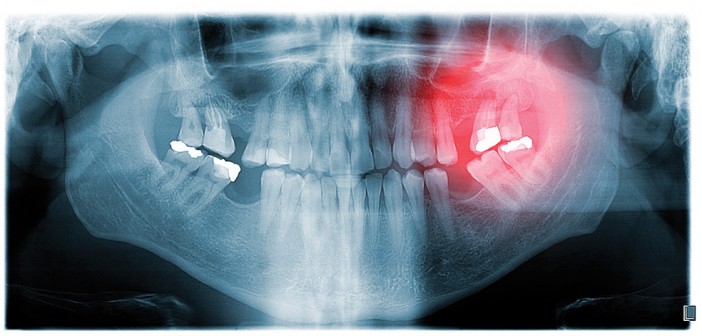You might be surprised to know that one of every two Americans over the age of 30 has periodontal disease. After the age of 65, this unfortunate statistic increases to 70 percent. Currently, 64.7 million Americans are affected – 56.4 percent are men and 38.4 percent are women.
Periodontal disease is a common oral infection caused by bacteria and is a chronic inflammatory disease that destroys the supporting tissues surrounding the teeth. The cause of the inflammation is the presence of plaque, which is a bio film of bacteria and debris that also causes cavities. This film begins to form on a tooth 20 minutes after brushing and calcifies within 24-72 hours. Untreated periodontal disease progresses rapidly into tooth loss.
Local factors that compound the formation of plaque include the presence of calculus, crowding of teeth, oral piercings and teeth-grinding – all lead to accelerated progress of the disease. Systemically, compromised immune systems, stress, diabetes, any hormonal changes such as pregnancy, oral contraceptive use, and menopause also adversely affect the progress of periodontal disease.
Active periodontal disease is identified by bleeding the gums on probing, and the loss of attachment of the tooth from the gingival tissues and periodontal ligament. People using bisphosphonate treatment for bone-related conditions have been shown to be at higher risk for periodontal disease, due to delayed and poor healing. In several cases, osteonecrosis (bone death) of the jaw has occurred, which requires immediate surgical intervention. The U.S. Surgeon General has noted an association between chronic oral infections, such as periodontal infections, and systemic diseases such as diabetes, heart disease, and pre-term low-weight babies. In light of this association, the Surgeon General now recommends a multi-disciplinary collaboration between medicine and dentistry to enhance oral and general health.
The rising epidemic of obesity is raising concerns of oral and general health. Obese people are more prone to periodontal disease because of compromised immune systems, uncontrolled blood glucose, and also insulin resistance. Cigarette smoking and periodontal disease have a synergistic effect on the progression of other disease. So, smokers need to be aware that they are eight times more prone than a non-smoker to develop cardiovascular disease and other systemic health issues.
Periodontal disease can be treated surgically and non-surgically. The “golden” treatment has been professional cleaning by a dental hygienist once every three months, scaling and root planing, which cleans between the gums and the teeth down to the roots. Use of minocycline with root planing increases the efficiency of non-surgical periodontal treatment. In more advanced stages, a periodontal specialist can perform surgery.
Recently, laser treatment has been used to treat the periodontal pockets with increasing success. Local irrigation of medicaments into the pockets is also effective. Photodynamic therapy used in combination with periodontal therapy has minimized the use of antibiotics in the treatment of periodontal disease; more research is awaited in this area.
The outcome of periodontal treatment is mainly impacted by oral self-care. Use of mechanical toothbrushes and a Waterpik®, regular flossing, medicated toothpastes and fluoride treatments are effective for enhancing oral health.
Periodontal disease is adversely associated with use of alcohol and tobacco, and zerostomia (dry mouth). Certain medicines such as cyclosporine in transplant patients, phenytoin in seizure patients, and calcium channel blockers for treating cardiovascular and hypertension issues can cause enlargement of gums, which enhances periodontal disease. Once periodontal disease is acquired, it can only be maintained – regular dental check-ups are imperative!
Information gathered from: PubMed, expertscape.com, review of articles in 2015 academic journal publications
Once periodontal disease is acquired, it can only be maintained – regular dental check-ups are imperative!















